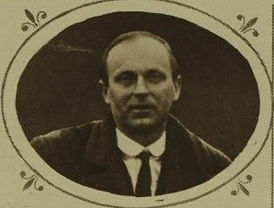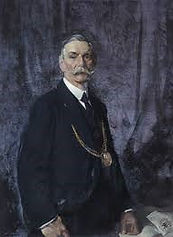Tom Kennedy MP

Our ninth story, penned by local historian and author David Potter, marks the centenary of one of Kirkcaldy's political milestones.
A by-election on March 4th, 1921, saw the electorate (including for the first time some, though not all, women) 'send forth' its first Labour MP to Westminster.
Tom Kennedy's victory, after a vibrant and colourful campaign, reflected an age of social and political change, which still resonates 100 years on.
In depth written study
March Forth on March 4th
It is not often than Kirkcaldy is the focus of interest, but that was what occurred on March 4 1921. Lloyd George was the Prime Minister of a Coalition Government with a huge majority, but times were hard. The recovery from the Great War was not going well, poverty abounded, the Spanish flu epidemic had waned but had not yet totally disappeared, Ireland was in perpetual uproar, and labour and industrial problems threatened.
Kirkcaldy’s Liberal Coalition MP Henry Dalziel had accepted a Baronetcy, and a by-election was called. The Conservatives decided not to stand and to give their support to Sir Robert C. Lockhart, proprietor of the Bennochy Works and one-time Provost of the town. He was a strong candidate and widely expected to win.

Tom Kennedy
He was opposed by Tom Kennedy for Labour. Labour had only been formed in 1900, and at the moment had 57 seats, but they were growing, to the alarm of the Conservatives and Liberals. What the middle and upper classes really feared was a revolution, as had happened only four years ago in Russia. Labour were wrongly perceived as Bolsheviks, even though Labour stressed that their aim was not violence, dictatorship or civil war. They merely wanted a more equitable division of wealth, and this was something that struck a chord in the hearts of the miners and the linoleum workers who were not unaware of the massive profits made by their bosses in the Great War.

Sir Robert C Lockhart
The campaign was fought cleanly by both candidates who expressed great respect for each other. Some of the supporters of each candidate were less pleasant people however, with threats from Lockhart’s supporters of what might happen to the Church, the King and people’s property if Labour won, while Kennedy’s men were heard once or twice singing songs like “The Red Flag” on the High Street to the terror of the establishment.
Polling was held on the wet day of Friday March 4 1921. Colours were seen all over the town of red and yellow for Lockhart as distinct from the pure red of Kennedy. A new factor was the opportunity for the first time ever in Kirkcaldy of women being allowed to vote. Total female suffrage was not yet in force, and the ladies who voted were middle class and would have voted for Lockhart, but they were charmed by the sight of Kennedy, his wife and baby son. Kennedy was clearly sincere and promised things like family allowance and even birth control clinics. He also had the working class vote (the 1918 Act gave the vote to all men) solidly behind him.
Excitement prevailed all Saturday morning in the High Street as they awaited the count. Rumours spread about how close it was, and it was not until late in the afternoon before the result was declared from the Town House in the High Street.
T Kennedy (Labour) 11, 674
Sir RC Lockhart (Coalition Liberal) 10, 199
It was close but Kirkcaldy now had its first ever Labour MP.